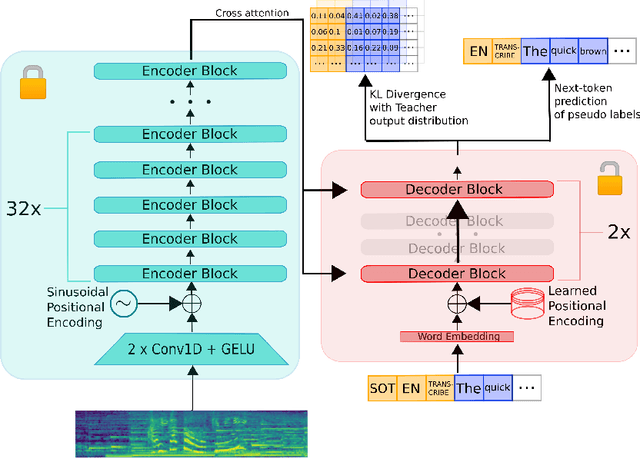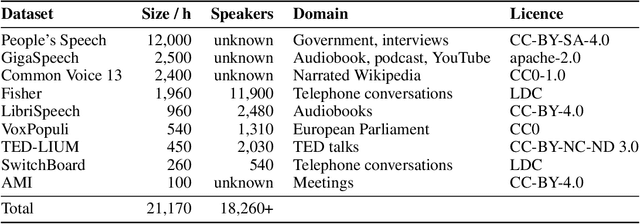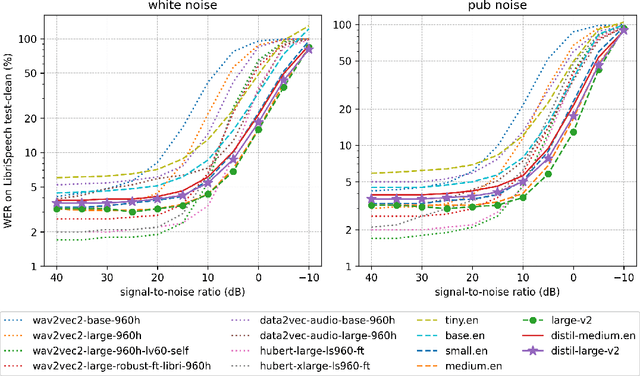Sanchit Gandhi
Ministral 3
Jan 13, 2026Abstract:We introduce the Ministral 3 series, a family of parameter-efficient dense language models designed for compute and memory constrained applications, available in three model sizes: 3B, 8B, and 14B parameters. For each model size, we release three variants: a pretrained base model for general-purpose use, an instruction finetuned, and a reasoning model for complex problem-solving. In addition, we present our recipe to derive the Ministral 3 models through Cascade Distillation, an iterative pruning and continued training with distillation technique. Each model comes with image understanding capabilities, all under the Apache 2.0 license.
Open ASR Leaderboard: Towards Reproducible and Transparent Multilingual and Long-Form Speech Recognition Evaluation
Oct 08, 2025Abstract:Despite rapid progress, ASR evaluation remains saturated with short-form English, and efficiency is rarely reported. We present the Open ASR Leaderboard, a fully reproducible benchmark and interactive leaderboard comparing 60+ open-source and proprietary systems across 11 datasets, including dedicated multilingual and long-form tracks. We standardize text normalization and report both word error rate (WER) and inverse real-time factor (RTFx), enabling fair accuracy-efficiency comparisons. For English transcription, Conformer encoders paired with LLM decoders achieve the best average WER but are slower, while CTC and TDT decoders deliver much better RTFx, making them attractive for long-form and offline use. Whisper-derived encoders fine-tuned for English improve accuracy but often trade off multilingual coverage. All code and dataset loaders are open-sourced to support transparent, extensible evaluation.
Voxtral
Jul 17, 2025Abstract:We present Voxtral Mini and Voxtral Small, two multimodal audio chat models. Voxtral is trained to comprehend both spoken audio and text documents, achieving state-of-the-art performance across a diverse range of audio benchmarks, while preserving strong text capabilities. Voxtral Small outperforms a number of closed-source models, while being small enough to run locally. A 32K context window enables the model to handle audio files up to 40 minutes in duration and long multi-turn conversations. We also contribute three benchmarks for evaluating speech understanding models on knowledge and trivia. Both Voxtral models are released under Apache 2.0 license.
Magistral
Jun 12, 2025



Abstract:We introduce Magistral, Mistral's first reasoning model and our own scalable reinforcement learning (RL) pipeline. Instead of relying on existing implementations and RL traces distilled from prior models, we follow a ground up approach, relying solely on our own models and infrastructure. Notably, we demonstrate a stack that enabled us to explore the limits of pure RL training of LLMs, present a simple method to force the reasoning language of the model, and show that RL on text data alone maintains most of the initial checkpoint's capabilities. We find that RL on text maintains or improves multimodal understanding, instruction following and function calling. We present Magistral Medium, trained for reasoning on top of Mistral Medium 3 with RL alone, and we open-source Magistral Small (Apache 2.0) which further includes cold-start data from Magistral Medium.
RASMALAI: Resources for Adaptive Speech Modeling in Indian Languages with Accents and Intonations
May 24, 2025Abstract:We introduce RASMALAI, a large-scale speech dataset with rich text descriptions, designed to advance controllable and expressive text-to-speech (TTS) synthesis for 23 Indian languages and English. It comprises 13,000 hours of speech and 24 million text-description annotations with fine-grained attributes like speaker identity, accent, emotion, style, and background conditions. Using RASMALAI, we develop IndicParlerTTS, the first open-source, text-description-guided TTS for Indian languages. Systematic evaluation demonstrates its ability to generate high-quality speech for named speakers, reliably follow text descriptions and accurately synthesize specified attributes. Additionally, it effectively transfers expressive characteristics both within and across languages. IndicParlerTTS consistently achieves strong performance across these evaluations, setting a new standard for controllable multilingual expressive speech synthesis in Indian languages.
Distil-Whisper: Robust Knowledge Distillation via Large-Scale Pseudo Labelling
Nov 01, 2023



Abstract:As the size of pre-trained speech recognition models increases, running these large models in low-latency or resource-constrained environments becomes challenging. In this work, we leverage pseudo-labelling to assemble a large-scale open-source dataset which we use to distill the Whisper model into a smaller variant, called Distil-Whisper. Using a simple word error rate (WER) heuristic, we select only the highest quality pseudo-labels for training. The distilled model is 5.8 times faster with 51% fewer parameters, while performing to within 1% WER on out-of-distribution test data in a zero-shot transfer setting. Distil-Whisper maintains the robustness of the Whisper model to difficult acoustic conditions, while being less prone to hallucination errors on long-form audio. Distil-Whisper is designed to be paired with Whisper for speculative decoding, yielding a 2 times speed-up while mathematically ensuring the same outputs as the original model. To facilitate further research in this domain, we make our training code, inference code and models publicly accessible.
AfroDigits: A Community-Driven Spoken Digit Dataset for African Languages
Apr 04, 2023Abstract:The advancement of speech technologies has been remarkable, yet its integration with African languages remains limited due to the scarcity of African speech corpora. To address this issue, we present AfroDigits, a minimalist, community-driven dataset of spoken digits for African languages, currently covering 38 African languages. As a demonstration of the practical applications of AfroDigits, we conduct audio digit classification experiments on six African languages [Igbo (ibo), Yoruba (yor), Rundi (run), Oshiwambo (kua), Shona (sna), and Oromo (gax)] using the Wav2Vec2.0-Large and XLS-R models. Our experiments reveal a useful insight on the effect of mixing African speech corpora during finetuning. AfroDigits is the first published audio digit dataset for African languages and we believe it will, among other things, pave the way for Afro-centric speech applications such as the recognition of telephone numbers, and street numbers. We release the dataset and platform publicly at https://huggingface.co/datasets/chrisjay/crowd-speech-africa and https://huggingface.co/spaces/chrisjay/afro-speech respectively.
BLOOM: A 176B-Parameter Open-Access Multilingual Language Model
Nov 09, 2022Abstract:Large language models (LLMs) have been shown to be able to perform new tasks based on a few demonstrations or natural language instructions. While these capabilities have led to widespread adoption, most LLMs are developed by resource-rich organizations and are frequently kept from the public. As a step towards democratizing this powerful technology, we present BLOOM, a 176B-parameter open-access language model designed and built thanks to a collaboration of hundreds of researchers. BLOOM is a decoder-only Transformer language model that was trained on the ROOTS corpus, a dataset comprising hundreds of sources in 46 natural and 13 programming languages (59 in total). We find that BLOOM achieves competitive performance on a wide variety of benchmarks, with stronger results after undergoing multitask prompted finetuning. To facilitate future research and applications using LLMs, we publicly release our models and code under the Responsible AI License.
ESB: A Benchmark For Multi-Domain End-to-End Speech Recognition
Oct 24, 2022Abstract:Speech recognition applications cover a range of different audio and text distributions, with different speaking styles, background noise, transcription punctuation and character casing. However, many speech recognition systems require dataset-specific tuning (audio filtering, punctuation removal and normalisation of casing), therefore assuming a-priori knowledge of both the audio and text distributions. This tuning requirement can lead to systems failing to generalise to other datasets and domains. To promote the development of multi-domain speech systems, we introduce the End-to-end Speech Benchmark (ESB) for evaluating the performance of a single automatic speech recognition (ASR) system across a broad set of speech datasets. Benchmarked systems must use the same data pre- and post-processing algorithm across datasets - assuming the audio and text data distributions are a-priori unknown. We compare a series of state-of-the-art (SoTA) end-to-end (E2E) systems on this benchmark, demonstrating how a single speech system can be applied and evaluated on a wide range of data distributions. We find E2E systems to be effective across datasets: in a fair comparison, E2E systems achieve within 2.6% of SoTA systems tuned to a specific dataset. Our analysis reveals that transcription artefacts, such as punctuation and casing, pose difficulties for ASR systems and should be included in evaluation. We believe E2E benchmarking over a range of datasets promotes the research of multi-domain speech recognition systems. ESB is available at https://huggingface.co/esb.
 Add to Chrome
Add to Chrome Add to Firefox
Add to Firefox Add to Edge
Add to Edge